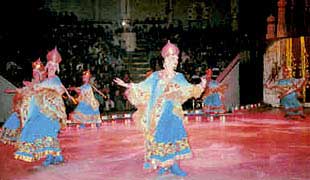![]()
Page 4 of 5
Story
and photos by David Carlson
© Copyright 1995 - All rights reserved
Page 1 | 2
| 3 | 4 | 5
10 p.m. Sunday, Oct. 22, 1995
Five of us, all Americans, are leaving the Moscow Circus. It’s an amazing experience. None of the tawdry hucksterism of America’s barnstorming circuses. No ringmasters. No tents. No three-ring extravaganzas. Just talent.
The Old Moscow Circus is not to be missed. The costumes are spectacular. Dancers, acrobats and even clowns perform their acts on ice skates.
 |
| The Old Moscow Circus is not to be missed. The costumes are spectacular. Dancers, acrobats and even clowns perform their acts on ice skates. |
It’s a one-ring affair that’s as much Ice Capades as circus. Everyone except the dancing bears wears ice skates. The costumes are awesome, even radiant, not aged and torn, and the performers are young and shapely. It’s in a permanent building where the “old” Moscow circus has performed for years. On the other side of town, I’m told, is the “new” Moscow circus, which also has performed for years. Why are there two, and what’s the difference? You’ve got me, but I can tell you this: The Russians love their circuses. The place is packed.
Anyway, it’s cold and we’ve been walking all day. One walks a great deal in Russia as cars are not standard equipment among Russians. Public transportation, especially the subway, is old but good, but it always seems to be a significant hike to the station. So, one walks. And walks. And walks.
Olga, our chaperone for the circus, will gladly walk us home, but we opt for an adventure in a taxi. She flags one down and has a staccato conversation with the driver. He’ll take us all to the Mir for 20,000 rubles, about $5.
I’m lucky. Since I’m tallest, I pile in front with the driver. The other four squeeze in the back, three sitting shoulder to shoulder, the fourth precariously balancing himself across their laps.
The driver seems a bit nervous about the whole thing, but off we go down the side streets, visions of easy rubles smiling in his dark eyes. A few blocks down, we hit a major intersection. Surprisingly, at this time of night, there’s a cop directing traffic.
With a blast of his whistle, the cop pulls us over, and the cabbie mutters a curse. It’s in Russian, but we understand perfectly. Curses are a rather universal language.
He jumps out, goes behind the car and has a fast-paced conversation with the policeman. Still muttering expletives, he returns, pulls a hidden wad of rubles from the visor and goes back. We know what’s going on, but we’re not sure why. Maybe there’s a law against having five in a cab?
A minute later, we’re back on the road, but the driver’s dark eyes are no longer smiling. Visions of easy money are gone. He looks at me and shrugs.
Shrugs are a pretty universal language, too. Translation: "Just another night in Moscow. No big deal. Nothing unusual because darned near everyone in Russia is on the take from everyone else."
Surreptitious transactions are a fact of life here. They have been for generations. Taxes, for example, are outrageous; companies are expected to pay a minimum of 50 percent tax on the salaries paid to employees. If that sounds bad, get this: If somebody makes more than $18 a week, the tax soars to 85 percent. In other words, an employee who is paid $100 a month actually costs the employer about $185. On top of that, a company’s profits are taxed at a flat 35 percent. No deductions.
The result? Most of the salaries are paid under the table, in cash, often in dollars. On the record, most workers make the minimum wage. Off the record, they get much more. There’s no other way for Russia’s fledgling entrepreneurs, like the mom-and-pop kiosk operators, to make ends meet.
The secret dollars usually aren’t banked, either.
"Most people’s life savings are in pillowcases or boxes," says a Russian friend who has traveled often to the West and does business in the U.S. "That’s the safest place." Banks, suddenly everywhere, fail far too often.
It’s another vicious cycle. The more people cheat, the more the government must raise taxes. The more taxes rise, the more people cheat.
"Where do you keep your savings?" I ask my Westernized friend. "Mutual funds," he chortles. "Merrill-Lynch." Then, he shrugs.